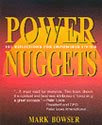Success: The P.U.S.H. Principle of Success
By Mark Bowser
Have you ever thought you were doing the right thing only to begin doubting yourself? Have you ever known you were doing what God wanted you to do but were still not succeeding? What is going on here? Does God want us to fail? Is He playing a trick on us? Of course not!
Not too long ago, I came across a wonderful story with an incredible principle for success. It goes something like this. Once upon a time, a man was sleeping peacefully in his cabin when all of a sudden the room filled with a brilliant blazing light. When the man’s eyes adjusted to the piercing light, he was shocked to see Jesus Christ standing in his room. The Lord said to the man, “Friend, I have work for you to do. Out in front of your cabin you will find a large rock. You are to push against that rock with all your strength.”
The next morning, the man awoke with more energy than he could ever remember having. Was it a dream he had of his visit with Jesus? Was it real? The man didn’t know whether it was a dream, vision, or what, but he knew what he was supposed to do. He was to push against the large rock outside his cabin.
The man got dressed and immediately went outside. He thought to himself, “I’ll get this rock moved for the Lord before breakfast.” The man pushed and pushed but the rock didn’t budge. Sweat began to pour off the man’s forehead into his eyes. Perspiration began to soak his shirt. Push after push, hour after hour, the man worked on his mission.
The days came and the days went and still the rock stood fast. One day, after many years of faithful pushing, the man’s spirit began to get discouraged. What was he doing this for?
Sensing the man’s discouragement and frustration, the Devil began placing evil thoughts into the man’s mind. “What are you doing? You are wasting your time. You have wasted your time for years. You are never going to move that rock.”
Discouraged, the man planned to not work as hard. He would only push a little bit. He was going to put in his time and rest for a change. However, the man finally decided to make it a matter of prayer. He said, “Father in Heaven. I don’t understand. I have worked hard at what You want me to do. Why am I not succeeding? Please guide me Lord Jesus. In Jesus’ precious Name I pray Amen.”
The Lord lovingly spoke to the man, “My child. I love you! When I asked you to serve me and you agreed, I asked you to push against that large rock. I never told you that you were to move the rock. You have been faithful and pushed with all your strength. Friend, don’t think your work was a waste of time. Look at yourself. You have grown through the struggle. The muscles in your arms are as strong as iron. Your back is like a fortress protecting a city. Your legs are like Redwood trees. You are better now than when you began. I will now move the rock.”
Many times we expect to move the mountains of our lives. The Bible tells us that if we have faith as small as a mustard seed then we can say to our mountain “MOVE!” and it will MOVE! But it doesn’t say we will move the mountain. God moves the mountains of our lives. All we have to do is believe and P.U.S.H. – Pray Until Something Happens!
Have you heard the new singing group 4 Troops? The group is made up of 4 military persons. They are awesome. In fact, a good friend of mine Matt Moran wrote their hit single For Freedom. Check it out at itunes or pre-order the album at amazon.com.
Mark Bowser is one of the top Corporate Trainers, Professional Speakers in the country today. He is also the author of 3 powerful books. He can be reached at his website www.MarkBowser.com or email info@MarkBowser.com.
A Champion Succeeds Through Power Communicating
By Mark Bowser
It has been said that public speaking is a fear worse than death for many people. Well, the truth is that we will not be as successful as we could be unless we improve our communication skills. In this article, we are going to explore some insights and action steps, which lead to more effective communication. The only way to really conquer a fear is to confront it and jump right in. With that in mind, let's get started.
1. Realize that communication may be the most important skill we can learn. We all need to be able to express our thoughts effectively. We are creatures of relationships. Relationships are very important to us. In order to make our relationships better we must make our communication better.
2. Guard our tongues. Sometimes the most important message is the one we never give. Have you ever said something and then wish we could take it back? I think all of us have. Controlling our tongues is one of the most important and most difficult communication challenges. In another chapter in this manual we go into more detail on how to accomplish this task.
3. Decide that communication is a priority. If something is a priority then what do we usually give it? ANSWER: Time and Commitment.
4. Talk with people not at them. Have you ever been talked DOWN to? How did it make you feel? How did you feel at that moment about the person talking to you? Not too good right? We need to talk WITH people. We need to make our communication conversational and user friendly. We need to ask ourselves, "How can I uplift this person as I express my thoughts and opinions?" This will help us communicate our messages in a more compassionate way. Even if we have to communicate some ugly message, compassion will see us through.
5. Have an open door policy. We must make time for people. If we lived in President Lincoln's day and wanted to speak with the president all we would have to do is walk in the White House and sit outside his door. When he came out, we would be able to speak with him. We need to do the same thing. If it worked for the president, it will work for us. If at that moment it is not appropriate, then make an appointment with them.
6. Understand what Dale Carnegie & Associates, Inc. believe when they say, "Communication is built on trusting relationships." If people don't trust us, then why would they listen to us?
7. Prepare, prepare, prepare. Speakers USA, Inc. was a national speakers association, which helped train me. They used to tell us that if we want a talk/presentation to look impromptu then make sure it is not. In other words do your homework and practice, practice, prepare, prepare, prepare.
8. Don't give a public presentation/talk unless you are passionate and knowledgeable about the topic. If we are not passionate about the topic then it will come across flat and boring. If we are not knowledgeable about the topic then our credibility will drop.
9. Make sure your body language, tone of voice, and message are congruent. Suppose I came up to you and said in a very gruff tone, "Sure, I would love to have the boss over for dinner!" Do you think I really want the boss to come over for dinner? You don't think so? Why? ANSWER: Because I wouldn't be congruent. When we aren't congruent in every way, then we give mixed messages to our listeners.
10. Have patience. Communication, particularly public communication, is not easy. Be patient with yourself. You won't become an expert overnight. Keep practicing and keep improving.
11. Look for the benefit of our differences. We need to constantly remind ourselves that different doesn't necessarily mean wrong.
12. If agreement cannot be made then agree to disagree. A great way to keep the peace.
13. Keep your cool when someone improperly states something. They may not be trying to insult you. Have you ever thought you were being insulted but were not sure? Instead of reactively attacking back, just wait. They may have just said something in an awkward fashion. Don't jump to conclusions. Believe me, if they were actually trying to insult you and they thought you didn't get it, they will insult you again. And if they were insulting you then just simply tell them that you don't appreciate it and that you forgive them.
14. Always try to part on a positive upbeat ending. Nobody likes to leave with a sour attitude in his/her stomach. Always try to make peace before you end a conversation.
15. Loyalty many times comes from private conversations. Build trust by keeping confidences.
16. Use stories to illustrate your points. Jesus Christ always used stories when He taught the crowds. Abraham Lincoln believed in stories too. Lincoln said, "They say I tell a great many stories. I reckon I do; but I have learned from long experience that plain people, take them as they run, are more easily influenced through the medium of a broad and humorous illustration than in any other way...." REMEMBER: ALWAYS HAVE A POINT TO YOUR STORY.
17. Learn to speak off the cuff (extemporaneously). Lincoln said, "Extemporaneously speaking should be practiced and cultivated. It is the lawyer's avenue to the public. However able and faithful he may be in other respects, people are slow to bring him business if he cannot make a speech." One way to practice this is to grab your local paper and read a few headlines. Practice speaking on those topics for 1-2 minutes for each topic.
18. Join a Toastmasters club. Toastmasters International is an international speaking club designed to help people of all walks of life become more effective communicators and thus more successful. I was a member of Toastmasters for years and I really enjoyed and benefited from the experience.
19. Remember, we don't have to make a long speech in order to be effective. Just say what needs to be said and then stop talking. I remind you of Abraham Lincoln's Gettysburg Address.
20. Use Millard Bennett's 30-10 Power Formula. What is the 30-10 Power Formula? First you read for 30 minutes everyday in whatever area you want to develop yourself in. This will build up your knowledge base. Of that 30 minutes, read out loud for 10 minutes. Reading out loud will improve your communication skills. It will improve your pronunciation, voice inflections, stamina, etc.... Of that 10 minutes, read part of it in a whisper, maybe a minute or two. Reading in a whisper will eliminate all those um, ahh, and all those other verbal fillers. This formula is one of the simplest formulas to practice but one of the most powerful. Try it for a month and see what you think.
21. Understand that an inspiring talk can change the face of an organization, nation, family, or an entire world. I remind you of Dr. Martin Luther King, Jr.'s "I have a dream" speech, JFK's challenge to put a man on the moon by the end of the decade, and Reagan's "Mr. Gorbachov tear down this wall."
I am convinced that if you really practice and work on these 21 steps you will become a POWER COMMUNICATOR and a greater success. Make it happen and have fun.
Check out Mark Bowser's incredible MP3 seminar "The Keys to Empowered Leadership" Click here
Check out some of the World's Best Speakers & Trainers on DVD. Click here
President/CEO
Empowering Enterprises, Inc.
7723 Tylers Place Blvd. #280
West Chester, OH 45069
(513)252-GOAL
Superior Training, Superior Results!
Check out our Complimentary Success Newsletters at www.MarkBowser.com & www.TakeActionSales.com
Come follow me on Twitter http://twitter.com/MarkBowser
Connect with me on LinkedIN
http://www.linkedin.com/in/markbowser
Come visit Mark Bowser's blogs www.SalesTrainingToday.blogspot.com & www.LeadershipStylesToday.blogspot.com

.jpg)




.jpg)
.jpg)
